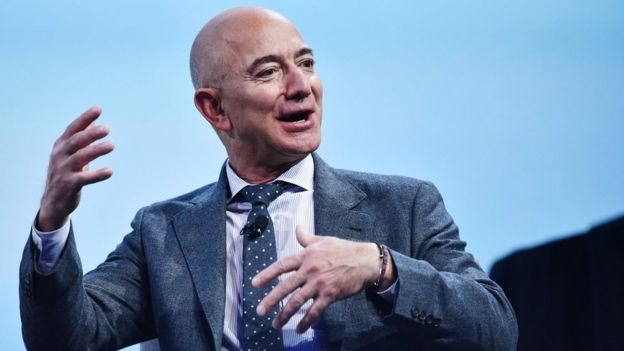The Pentagon has awarded a $10bn (£8bn) cloud-computing contract to Microsoft, following a heavily-scrutinised bidding process in which Amazon had been seen as the favourite.
The 10-year contract for the Joint Enterprise Defence Infrastructure, or Jedi, is aimed at making the US defence department more technologically agile.
Amazon’s bid drew criticism from its rivals and US President Donald Trump.
The company on Friday said it was “surprised” by the decision.
A “detailed assessment purely on the comparative offerings” would “clearly lead to a different conclusion”, it said.
In its statement, the Pentagon said all offers “were treated fairly”.
What is Jedi?
The Department of Defense wants to replace its aging computer networks with a single cloud system.
Under the contract, Microsoft will provide artificial intelligence-based analysis and host classified military secrets among other services.
It is hoped that Jedi will give the military better access to data and the cloud from battlefields.
Is the decision controversial?
Amazon had been considered the front-runner – until President Trump began questioning whether the process was fair.
In July he told reporters that he was getting “tremendous complaints about the contract with the Pentagon and Amazon”.
He said other companies had told him that the contract “wasn’t competitively bid” and that his administration would “take a very long look” at the process.
Mr Trump has repeatedly criticised Amazon and its founder Jeff Bezos – who also owns the Washington Post newspaper – in the past.
How did we get here?
The announcement marked the end of a long process that had pitted tech giants Microsoft, Amazon, Oracle and IBM against each other.
As the world’s biggest provider of cloud-computing services, Amazon had been the favourite to win Jedi. But its competitors argued that the process was unfair.

Oracle challenged the bidding process in federal court earlier this year, saying that it was rigged to favour Amazon, but a federal judge dismissed the allegation.
What else does the Pentagon say?
It said that it had awarded more than $11bn in 10 separate cloud-computing contracts over the past two years.
The Jedi deal “continues our strategy of a multi-vendor, multi-cloud environment as the department’s needs are diverse and cannot be met by any single supplier,” it added.
Microsoft has not yet issued a statement.



